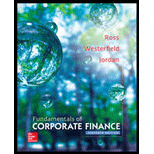
Fundamentals of Corporate Finance
11th Edition
ISBN: 9780077861704
Author: Stephen A. Ross Franco Modigliani Professor of Financial Economics Professor, Randolph W Westerfield Robert R. Dockson Deans Chair in Bus. Admin., Bradford D Jordan Professor
Publisher: McGraw-Hill Education
expand_more
expand_more
format_list_bulleted
Question
Chapter 12.3, Problem 12.3ACQ
Summary Introduction
To discuss: The meaning of risk premium.
Introduction:
Risk refers to the movement in the value of an investment. The movement can be positive or negative. The investor will gain if the movement is positive, and the investor will lose if the movement is negative.
Expert Solution & Answer
Want to see the full answer?
Check out a sample textbook solution
Students have asked these similar questions
What is the risk premium?
What is risk return ratio?
What is the relationship between risk and return?
Chapter 12 Solutions
Fundamentals of Corporate Finance
Ch. 12.1 - Prob. 12.1ACQCh. 12.1 - Why are unrealized capital gains or losses...Ch. 12.1 - What is the difference between a dollar return and...Ch. 12.2 - Prob. 12.2ACQCh. 12.2 - Why doesnt everyone just buy small stocks as...Ch. 12.2 - What was the smallest return observed over the 88...Ch. 12.2 - About how many times did large-company stocks...Ch. 12.2 - What was the longest winning streak (years without...Ch. 12.2 - How often did the T-bill portfolio have a negative...Ch. 12.3 - Prob. 12.3ACQ
Ch. 12.3 - What was the real (as opposed to nominal) risk...Ch. 12.3 - Prob. 12.3CCQCh. 12.3 - What is the first lesson from capital market...Ch. 12.4 - In words, how do we calculate a variance? A...Ch. 12.4 - With a normal distribution, what is the...Ch. 12.4 - Prob. 12.4CCQCh. 12.4 - What is the second lesson from capital market...Ch. 12.5 - Prob. 12.5ACQCh. 12.5 - Prob. 12.5BCQCh. 12.6 - What is an efficient market?Ch. 12.6 - Prob. 12.6BCQCh. 12 - Chase Bank pays an annual dividend of 1.05 per...Ch. 12 - The risk premium is computed as the excess return...Ch. 12 - Prob. 12.4CTFCh. 12 - Prob. 12.5CTFCh. 12 - Prob. 12.6CTFCh. 12 - Investment Selection [LO4] Given that Fannie Mae...Ch. 12 - Prob. 2CRCTCh. 12 - Risk and Return [LO2, 3] We have seen that over...Ch. 12 - Market Efficiency Implications [LO4] Explain why a...Ch. 12 - Efficient Markets Hypothesis [LO4] A stock market...Ch. 12 - Semistrong Efficiency [LO4] If a market is...Ch. 12 - Efficient Markets Hypothesis [LO4] What are the...Ch. 12 - Stocks versus Gambling [LO4] Critically evaluate...Ch. 12 - Efficient Markets Hypothesis [LO4] Several...Ch. 12 - Efficient Markets Hypothesis [LO4] For each of the...Ch. 12 - Calculating Returns [LO1] Suppose a stock had an...Ch. 12 - Calculating Yields [LO1] In Problem 1, what was...Ch. 12 - Prob. 3QPCh. 12 - Prob. 4QPCh. 12 - Nominal versus Real Returns [LO2] What was the...Ch. 12 - Bond Returns [LO2] What is the historical real...Ch. 12 - Prob. 7QPCh. 12 - Risk Premiums [LO2, 3] Refer to Table 12.1 in the...Ch. 12 - Calculating Returns and Variability [LO1] Youve...Ch. 12 - Calculating Real Returns and Risk Premiums [LO1]...Ch. 12 - Calculating Real Rates [LO1] Given the information...Ch. 12 - Prob. 12QPCh. 12 - Prob. 13QPCh. 12 - Calculating Returns and Variability [LO1] You find...Ch. 12 - Arithmetic and Geometric Returns [LO1] A stock has...Ch. 12 - Arithmetic and Geometric Returns [LO1] A stock has...Ch. 12 - Using Return Distributions [LO3] Suppose the...Ch. 12 - Prob. 18QPCh. 12 - Distributions [LO3] In Problem 18, what is the...Ch. 12 - Blumes Formula [LO1] Over a 40-year period an...Ch. 12 - Prob. 21QPCh. 12 - Calculating Returns [LO2, 3] Refer to Table 12.1...Ch. 12 - Using Probability Distributions [LO3] Suppose the...Ch. 12 - Using Probability Distributions [LO3] Suppose the...Ch. 12 - Prob. 1MCh. 12 - Prob. 2MCh. 12 - Prob. 3MCh. 12 - Prob. 4MCh. 12 - A measure of risk-adjusted performance that is...Ch. 12 - Prob. 6M
Knowledge Booster
Similar questions
arrow_back_ios
SEE MORE QUESTIONS
arrow_forward_ios
Recommended textbooks for you
 Financial Reporting, Financial Statement Analysis...FinanceISBN:9781285190907Author:James M. Wahlen, Stephen P. Baginski, Mark BradshawPublisher:Cengage Learning
Financial Reporting, Financial Statement Analysis...FinanceISBN:9781285190907Author:James M. Wahlen, Stephen P. Baginski, Mark BradshawPublisher:Cengage Learning

Financial Reporting, Financial Statement Analysis...
Finance
ISBN:9781285190907
Author:James M. Wahlen, Stephen P. Baginski, Mark Bradshaw
Publisher:Cengage Learning